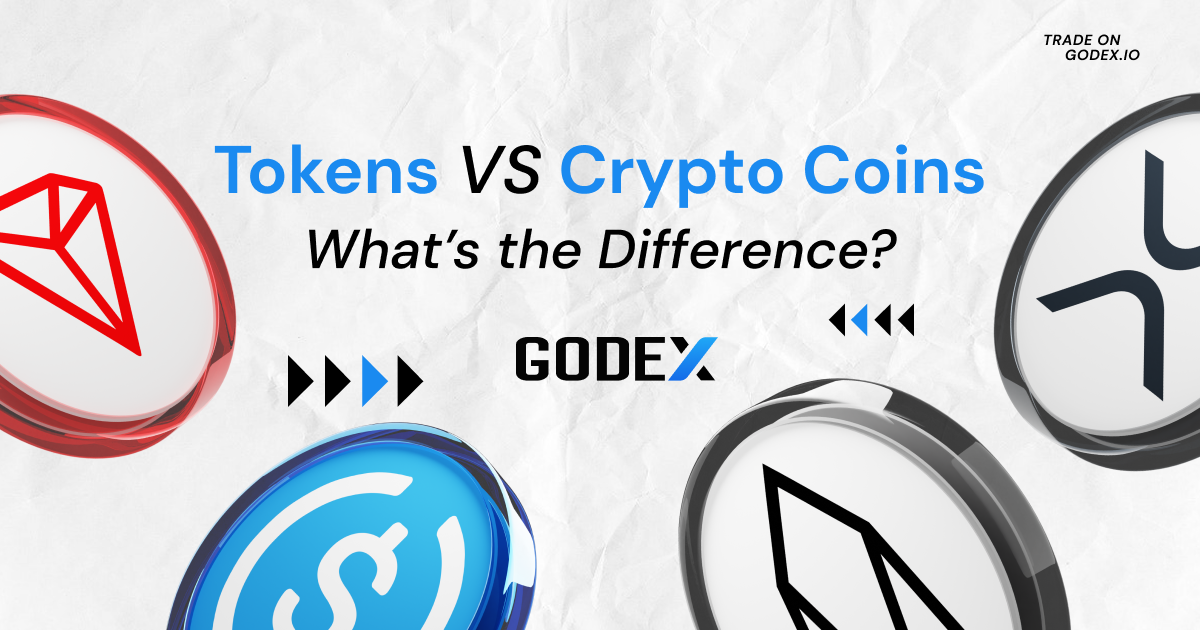Table of Contents
Newbies in the field often confuse these two terms and do not know the difference. However, there is one, and that is pretty solid. In this article, you will find out the main difference between a token vs coin, the ways they are created, and what makes the best investment. Take a look.
What is a coin?
Cryptocurrencies associated directly with a specific blockchain are termed ‘coins’. They are standalone entities, intrinsically linked to their native blockchains and can’t be utilized on other chains in their original state. Coins primarily serve three roles:
- Means of Transaction
- Preservation of Worth
- Measurement for economic matters
Among the forerunners in the coin domain are Bitcoin, Ethereum, and Dogecoin.
The creation of a coin is a process often called mining. To break it down, computers engage in solving intricate mathematical challenges and in the process, validate transactions. The first computer to crack this puzzle is granted newly minted coins, ensuring that the network remains both secure and distributed.
Before exploring the difference between a coin vs token, let’s get to know what a token is.
What is a crypto token?
Cryptocurrency coins and tokens both emerge from the bedrock of blockchain technology. Yet, there’s a distinct difference: tokens aren’t born from a blockchain’s core. Instead, they are constructed atop these chains, often employing advanced smart contracts to cater to multifaceted roles.
Whereas crypto coins parallel conventional monetary systems, tokens resonate more with assets or entitlements. Think of a token as a digital representation: it could symbolize a stake in a Decentralized Autonomous Organization (DAO), be a digital collectable like an NFT, or even stand for a tangible entity. Although tokens can be procured, bartered, or exchanged in ways similar to coins, they aren’t embraced as regular transactional mediums.
Drawing an analogy from the tangible world, consider tokens akin to discount tokens or tickets, while coins relate more to the familiar notes and coins.
Primarily, crypto tokens are conceptualized to integrate within a distinct blockchain initiative or a decentralized application (Dapp). In contrast to a crypto token vs coin, tokens aren’t extracted via mining; they originate and disseminate from the project’s innovator. Once acquired, the horizon of possibilities and offerings for using these tokens is vast and intriguing.
Basic distinction
When focusing on their primary function and purpose, coins primarily serve as financial instruments that are designed to make transactions easier. A coin will typically have multiple characteristics that define it, including the following:
- Exchange equivalence refers to a situation in which one unit is equivalent in value to another of its sort.
- Nature that allows for greater fractionation of individual units Splittable nature.
- Widespread Acceptance: These cryptocurrencies have gained widespread acceptance for use in commercial and financial activities.
- Existence that is Limited: The total volume of all of these units has already been decided upon and will not alter.
- Standardised worth is when every different iteration of a designated value keeps the same overall value.
- Transferability: These components are able to be moved and switched with relative ease.
- Utilisation on a Repeated Basis: Their inherent value is preserved even after being used a number of times.
Tokens, on the other hand, have a wider range of capabilities than only their monetary uses, making them a more versatile form of digital currency. Now, does crypto coin vs token differ by type? Let’s read on.
Basic Token and Coin Types
Tokens, in the vast world of cryptocurrencies, fall into distinctive classifications: security, equity, utility, and payment tokens. Each class plays a crucial role in raising capital for project advancement. Let’s delve into the inherent attributes and applications of these tokens.
The world of crypto tokens is variegated:
Governance Tokens: These offer enthusiasts the privilege to vote within a DAO framework.
Functional Tokens: These serve as keys, granting users privileges or access to specific services or goods envisioned by the token’s originator.
Asset-backed Tokens: Mirroring traditional investment instruments, they often find recognition and regulation akin to conventional financial securities by several official bodies.
Cryptocurrency coin vs. token: differentiation by factors
Speaking of coins, diverse factors like their origination method, intrinsic worth, and purpose lead to different coin categories. Here’s a brief overview:
Primary Coins: Operating on dedicated blockchains, these coins act as the chief currency of that ecosystem. Notable mentions include Bitcoin (BTC), Ethereum (ETH), and Litecoin (LTC).
Derivative Coins: Originating from an existing blockchain by diverging from its path, these coins are a by-product of blockchain forks. Bitcoin Cash (BCH), Bitcoin SV (BSV), and Ethereum Classic (ETC) fall into this category.
Encapsulated Coins: Representing an asset from another blockchain, these coins offer cross-chain operability and enhanced liquidity. Wrapped Bitcoin (WBTC) and Wrapped Ether (WETH) are quintessential examples.
Stable Value Coins: Their worth is anchored to a tangible asset, be it conventional currency or precious metals, aiming for consistent value and dampened volatility. Tether (USDT) and USD Coin (USDC) are two primary examples.
The Role of Tokens and Coins in Blockchain Ecosystems
Does a token vs coin crypto have different roles in blockchains? Within the blockchain ecosystem, tokens act as digital assets, facilitating the safe and efficient transfer, storage, and validation of information and worth. These cryptographic tokens can manifest in diverse shapes and can be imbued with distinct features, broadening their potential applications.
Broadly, a token symbolizes a specific asset or function. In the realm of blockchain, tokenization refers to the transformation of valuable entities into digital tokens suitable for blockchain platforms.
These digitally represented assets can echo physical valuables such as precious metals, properties, and artworks, or abstract commodities like decision-making power, proprietorship credentials, or content licenses. Essentially, any item possessing value, capable of ownership, and potential integration into a grander asset ecosystem can undergo tokenization.
Coins denote any cryptocurrency operating on a self-sustaining, autonomous blockchain, akin to Bitcoin. In essence, if a cryptocurrency operates atop its unique blockchain, it qualifies as a coin. Such inherent coins facilitate payment of transactional costs and engagement within the network. Moreover, it’s this very coin that network members are awarded as a token of appreciation for bolstering the network’s security.
In contrast to coin vs. token crypto, coins provide the foundational stability and security of a network, whereas tokens empower blockchain applications and platforms to enhance and expand on that foundation.
FAQ
How are coins and tokens created?
Cryptocurrency coins undergo a mining process, while tokens don’t. Instead, the project’s architect is in charge of creating and disseminating tokens. After acquisition, token holders can deploy them in a myriad of applications.
Are coins and tokens subject to regulation?
As the prominence of cryptocurrency has grown in the worldwide investment arena, nations have adopted diverse strategies in their regulation of this asset category. Check with the country’s regulations.
Which option is better for investment: coins or tokens?
When acquired judiciously, tokens can significantly amplify your coin reserves. Envision coins as currency and tokens as investment vehicles. By strategically deploying your coins in pivotal blockchain projects, you can potentially enhance your capital.
Start a Cryptocurrency exchange
Try our crypto exchange platform
Disclaimer: Please keep in mind that the content of this article is not financial or investing advice. The information provided is the author’s opinion only and should not be considered as direct recommendations for trading or investment. Any article reader or website visitor should consider multiple viewpoints and become familiar with all local regulations before cryptocurrency investment. We do not make any warranties about reliability and accuracy of this information.
 Linda Larsen
Linda Larsen 
Read more
Ripple (XRP) price has been widely discussed by the cryptocurrency community since it has gained public interest in 2017, even though it was founded by Chris Larsen and Jed McCaleb years before. The platform offers innovative blockchain solutions for the banking sector and has the potential to disrupt the whole finance industry. In recent years, […]
In this article we will talk about Ripple (XRP) and its price prediction. What is Ripple (XRP) Ripple is a San Francisco-based startup that was launched in 2012 by Ripple Labs as a global network both for cross-currency and gross payments. Ripple history began in 2004 with the discussions around the digital coin in the […]
You may well think that an article dedicated to a Tether price prediction or the Tether price in general is a little bit strange — it is a stablecoin after all. However, the price of Tether does fluctuate significantly, although it is nowhere near as volatile as non-stablecoin cryptos. This means that staying up to […]
In the article we share our vision at Zcash cryptocurrency main features and add several price predictions. As cryptocurrencies gain global acceptance and decentralisation slowly enters our lives, privacy becomes the main concern when talking about blockchain adoption. It is no secret that distributed ledger is by far the most secure and transparent technology ever […]
Chiliz coin (CHZ) offers a compelling opportunity for traders interested in the intersection of blockchain technology and sports. By enabling fans to influence team decisions through the Socios app, Chiliz directly monetizes fan engagement and connects with major sports teams like Juventus and Paris Saint-Germain. These partnerships not only enhance the platform’s visibility but also […]
The exponential growth of Bitcoin Satoshi Vision (BSV) against the general bear trend on the cryptocurrency market in autumn 2019 has impressed the community. Due to the increasing market capitalization, the newly emerged altcoin was ranked 5th on CoinMarketCap and managed to maintain its high position at the beginning of 2020. In the article we […]